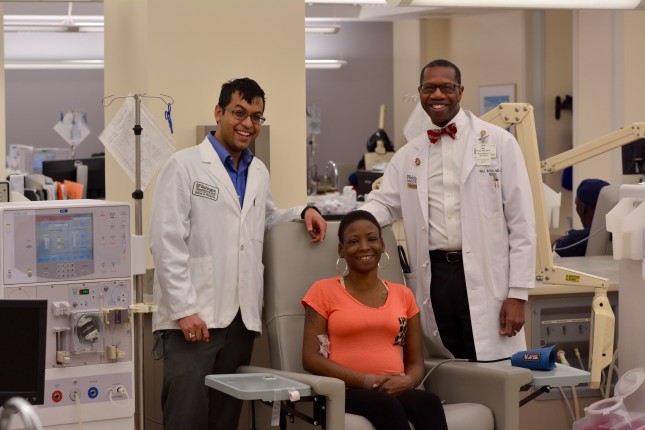
MD/PhD student Avik Som with dialysis patient Karen Harrold and nephrologist Will Ross, MD, MPH, in the WU Chromalloy American Kidney Center.
Can a simple text or an automated phone call dramatically reduce the number of missed dialysis appointments and hospitalizations due to renal complications? The answer, amazingly, is ‘yes,’ thanks to an innovative message-based technology platform developed by Washington University students.
“I was shocked that something so simple could have such a profound result,” says nephrologist Will Ross, MD, MPH, who served as principal investigator of a six-month pilot project in Washington University’s Chromalloy American Kidney Center last year. “I expected a modest response, but we actually saw a 75 percent decline in the median number of missed appointments. We also saw an approximately 50 percent reduction in the number of patients who had to be hospitalized during that same timeframe.”
The results came after the dialysis center began using EpxDialysis, a simple but highly effective automated message system that combines proactive, friendly appointment reminders with immediate one-button, toll-free phone access to reschedule appointments or discuss any health concerns with their dialysis team.
“Dialysis patients come to the clinic, on average, 13 times a month. It’s like a part-time job with no weekends or holidays off and adherence is hard,” says Avik Som, a WU MD/PhD student and co-founder of Epharmix, who led a team to develop EpxDialysis. Som is the founder of IDEA Labs, a bioengineering design incubator on campus that already has resulted in multiple inventions moving toward commercialization. In 2012, he focused teams of students in clinics to identify and remove barriers to better care and health outcomes. Epharmix, the simple automated messaging system, grew out of that and now is being tested in 15 different clinical settings, including dialysis, where the system is customized and called EpxDialysis.
“It worked phenomenally well for many of the patients enrolled in the pilot project,” says Brenda Bingel, RN, MSN, manager of the Chromalloy American Kidney Center. “We have one patient who is especially enthusiastic. Before, her adherence rate would not let her be a candidate for transplant, but now she is. It’s because the messages are carefully crafted to convey the essence of caring and the fact that we are their partners in keeping them healthy.”
The technology already is proving to be remarkably transferrable to other disease categories that have patient treatment issues, such as COPD. It also has demonstrated cost and operational benefits. Explains Som, “The system is always on time. You don’t need a large staff to implement this and you reduce the dollars that could be lost by having an unused dialysis station.”
With great outcomes already, Epharmix has attracted substantial investment from leading venture capitalists in St. Louis and San Francisco. It’s now under further evaluation at other health systems. “This remarkable technology needs to be validated in other units,” Ross says. “We would love it if alumni would evaluate this in their own institutions. We think the technology could be a new standard of care practice and we are eager to share this.”